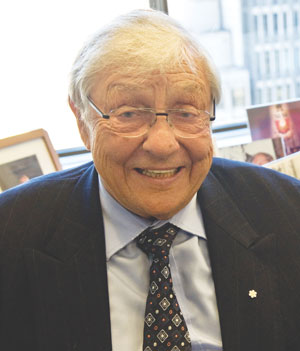Avoiding conflicts of interest when former judges take on public inquires is a “big headache” for the law firms they work for, says former Ontario chief justice Roy McMurtry.

McMurtry made the comments following recent events related to the issue in Toronto. Two weeks after his appointment by Toronto police Chief Bill Blair to review police use of force in the aftermath of the Sammy Yatim shooting, former associate chief justice Dennis O’Connor withdrew from the role, citing complaints of conflict of interest from lawyers and Yatim’s family.
“It is with regret that I announce that I have decided to withdraw from the review that Chief Blair announced on August 12, 2013. The basis for the decision is my position as counsel with Borden Ladner Gervais LLP (BLG), which also acts for the insurers of the Toronto Police Service in civil suits, some of which include allegations of the wrongful use of lethal force,” said O’Connor in a statement.
“Upon careful consideration, I have come to the conclusion that my association with BLG may raise a public discussion about this issue that would be distracting and unfortunate. I regret that this issue has arisen but I am of the view that if there is any possibility of concern in a matter such as this, it is best to address it at the outset.”
McMurtry, now counsel with Gowling Lafleur Henderson LLP, says he trusts O’Connor’s choice was the right one.
“Dennis’ judgment in my view is absolutely impeccable. Whatever decision he made would be the right decision. I have great admiration for his ability as a person.”
Yet, the possibility of a conflict whenever former judges conduct reviews and ultimately give an opinion is a quagmire all big law firms continue to deal with, McMurtry notes.
“Basically, the major issue is whether or not your opinion is contrary to the interest of a former client even though the issue is entirely different than what the firm has dealt with in the past,” he says.
McMurtry himself has conducted three major public policy reviews for former Ontario premier Dalton McGuinty’s government. A particularly notable one followed the 2010 G20 summit in Toronto when the government asked McMurtry to review the so-called secret law that reportedly allowed police to search anyone who was within five metres of fences built around the downtown core during the meeting.
The report McMurtry produced suggested scrapping the Public Works Protection Act as it gave a “troubling” breadth of power to police to make arrests.
At Gowlings, McMurtry says a department considers possible conflicts of interest when a former judge now at the firm looks to conduct a review. But as demonstrated in O’Connor’s case, the conflicts aren’t always legal ones but can instead relate to opposition from the public, clients, and other lawyers.
In O’Connor’s case, he had “an emotionally charged file,” says legal ethics writer and lawyer Philip Slayton. He suggests the former judge was right to be sensitive.
“I was surprised that Dennis O’Connor resigned so quickly. I thought it was sort of a great sensitivity to the issue. I guess he foresaw potential criticism coming his way and coming to the law firm. I’m not sure it was necessary but it shows real sensitivity to the situation.”
But what constitutes a conflict isn’t always clear. “There is the obvious, in-your-face conflict that everybody knows and you should avoid at all costs and the Supreme Court of Canada has jurisprudence on that,” says Slayton. “But there’s a whole range of other conflicts that are hard to define and some people take more seriously than others.”
There have been times when conflicts of interest became such a concern that senior practitioners have left their firms altogether.
McMurtry mentions renowned international arbitrator Yves Fortier, who left Norton Rose OR LLP, now Norton Rose Fulbright Canada LLP, a couple of years ago to pursue his career independently.
“He was in such demand in international arbitration that he had to withdraw from the firm to free himself from the conflicts,” says McMurtry. “He was running into so much conflict that he publicly announced he’s basically going out on his own.”
At the time, Fortier said the decision had been a “very emotional” one given his 50 years at the firm.
“That’s an example of the problem law firms face. It’s a reality of life at a big law firm,” says McMurtry.
There’s no easy answer to how law firms and former judges should handle such situations, he adds. The issue, he notes, is “very complex” and something law firms should handle on a case-by-case basis.
“I think these types of cases are best left to the good judgment and good sense of a law firm and the lawyers involved,” says Slayton. “I think it would be a mistake to devise a formula.”
While firms must be sensitive to all kinds of conflicts, it should ultimately be the lawyer or former judge involved who makes the call, he adds. “These retired judges are very smart and experienced people, and I think we can have a lot of faith in their discretion and good sense when it comes to something like this.”

 McMurtry made the comments following recent events related to the issue in Toronto. Two weeks after his appointment by Toronto police Chief Bill Blair to review police use of force in the aftermath of the Sammy Yatim shooting, former associate chief justice Dennis O’Connor withdrew from the role, citing complaints of conflict of interest from lawyers and Yatim’s family.
McMurtry made the comments following recent events related to the issue in Toronto. Two weeks after his appointment by Toronto police Chief Bill Blair to review police use of force in the aftermath of the Sammy Yatim shooting, former associate chief justice Dennis O’Connor withdrew from the role, citing complaints of conflict of interest from lawyers and Yatim’s family.